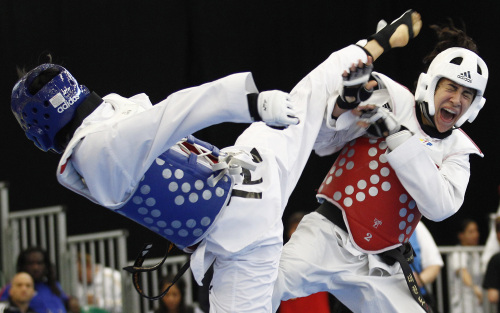MANCHESTER, England (AP) ― Since becoming an Olympic event, taekwondo has largely ditched its traditions, creating a split in the martial sport.
At last weekend’s British Open, more than 400 top competitors took part in a key event leading to the 2012 London Olympics. Many of the medals went to Britain, France and Iran.
Taekwondo’s governing body rewrote the rules last year to award fighters more points for head shots. Since then, many of the best players now often throw fancy spinning and jumping kicks that were once seen only occasionally.
Some taekwondo purists say the changes have gone too far and argue the Olympic-style fighting bears no resemblance to the martial art’s origins in Korea.
But Britain team coach Joseph Salim said the changes made to taekwondo in recent years were needed to make the sport relevant for the Olympics.
“The race for medals may take away a little bit from the martial art, but it’s more dynamic and modern now,” Salim said.
At last weekend’s British Open, more than 400 top competitors took part in a key event leading to the 2012 London Olympics. Many of the medals went to Britain, France and Iran.
Taekwondo’s governing body rewrote the rules last year to award fighters more points for head shots. Since then, many of the best players now often throw fancy spinning and jumping kicks that were once seen only occasionally.
Some taekwondo purists say the changes have gone too far and argue the Olympic-style fighting bears no resemblance to the martial art’s origins in Korea.
But Britain team coach Joseph Salim said the changes made to taekwondo in recent years were needed to make the sport relevant for the Olympics.
“The race for medals may take away a little bit from the martial art, but it’s more dynamic and modern now,” Salim said.

Salim said he prefers training fighters with a traditional background, meaning knowledge of the stylized fight patterns developed years ago.
“If you are really good at (patterns), it’s easier to polish your fighting style,” he said, explaining that some of the traditional taekwondo stances can be easily tweaked for Olympic-style sparring.
All competitors in major events, including the Olympics, must hold a taekwondo black belt certified by the martial art’s ruling body in Seoul ― which demands expertise in sparring as well as the stylized patterns and self-defense techniques. But once fighters get the black belt, nearly all abandon the martial art’s traditional elements.
“I can’t even remember the last time I did a (pattern),” said Britain player Lutalo Muhammad, whose specialties are the spinning and jumping kicks that give him the impression of almost flying in the ring. “Maybe I’ll go back to the traditional side once my fighting career is over.”
Others say the taekwondo seen in the Olympics doesn’t even merit the name and is mere showboating. Just as the Korean war split the country in two, so too did a division emerge in taekwondo. One faction founded the International Taekwondo Federation in 1966, which remains staunchly traditional and incorporates more punching and hand strikes. Its style of taekwondo is practiced by the North Korean army.
On the other side is the World Taekwondo Federation, the Olympic sport’s ruling body. Since the group was formed in 1973, it has marketed taekwondo so successfully it is now the world’s most popular martial art.
“Olympic taekwondo is not taekwondo,” said Ri Yong-son, chief director of the International Taekwondo Federation. “There is no understanding of the martial arts philosophy.”
Taekwondo in the Olympics still retains some traditional elements ― competitors bow to each another and the referee before and after the match and pay respects to their opponent’s coaches after the match, and all commands are in Korean.
Critics say such practices are mere formalities, however, and point to the example of the Cuban taekwondo player so incensed at a referee’s decision at the Beijing Olympics he kicked him in the head. Ri said that incident illustrates how little understanding many Olympic taekwondo fighters have of the importance of respect in martial arts.
He also criticized Olympic-style taekwondo for focusing almost exclusively on kicks, since punches are only allowed to the body and worth only one point.
“They never punch,” he said of Olympic taekwondo players. “That is not a good way to fight.”
But Ri acknowledged that fighters dreaming of an Olympic medal should learn the other style.
That’s what convinced Britain fighter Ruebyn Richards to switch taekwondo styles.
“I did both styles for awhile, but it was the prospect of the Olympics that helped me make the decision,” he said.
Though Richards spent years perfecting his knowledge of taekwondo’s traditional stylized patterns, practicing one these days qualifies as punishment.









![[Hello India] Hyundai Motor vows to boost 'clean mobility' in India](http://res.heraldm.com/phpwas/restmb_idxmake.php?idx=644&simg=/content/image/2024/04/25/20240425050672_0.jpg&u=)









